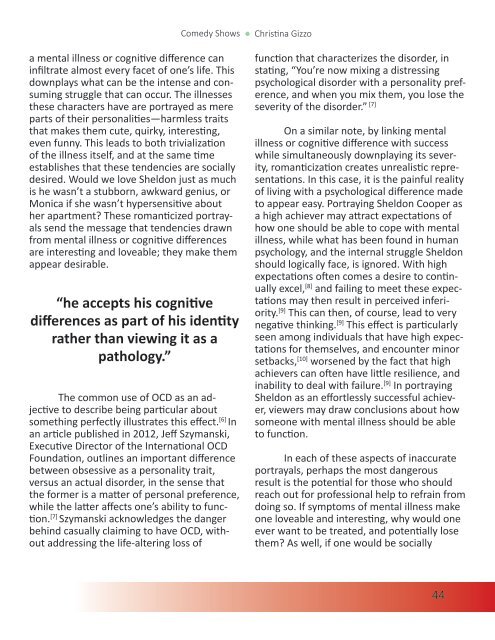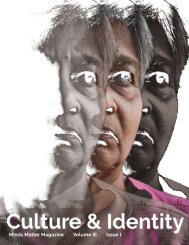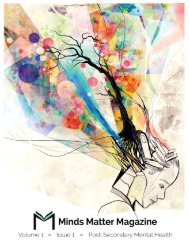E-Issue3_Finallydonep
You also want an ePaper? Increase the reach of your titles
YUMPU automatically turns print PDFs into web optimized ePapers that Google loves.
Comedy Shows<br />
Christina Gizzo<br />
Minds Matter Magazine Volume II Issue I Arts & Media<br />
a mental illness or cognitive difference can<br />
infiltrate almost every facet of one’s life. This<br />
downplays what can be the intense and consuming<br />
struggle that can occur. The illnesses<br />
these characters have are portrayed as mere<br />
parts of their personalities—harmless traits<br />
that makes them cute, quirky, interesting,<br />
even funny. This leads to both trivialization<br />
of the illness itself, and at the same time<br />
establishes that these tendencies are socially<br />
desired. Would we love Sheldon just as much<br />
is he wasn’t a stubborn, awkward genius, or<br />
Monica if she wasn’t hypersensitive about<br />
her apartment? These romanticized portrayals<br />
send the message that tendencies drawn<br />
from mental illness or cognitive differences<br />
are interesting and loveable; they make them<br />
appear desirable.<br />
“he accepts his cognitive<br />
differences as part of his identity<br />
rather than viewing it as a<br />
pathology.”<br />
The common use of OCD as an adjective<br />
to describe being particular about<br />
something perfectly illustrates this effect. [6] In<br />
an article published in 2012, Jeff Szymanski,<br />
Executive Director of the International OCD<br />
Foundation, outlines an important difference<br />
between obsessive as a personality trait,<br />
versus an actual disorder, in the sense that<br />
the former is a matter of personal preference,<br />
while the latter affects one’s ability to function.<br />
[7] Szymanski acknowledges the danger<br />
behind casually claiming to have OCD, without<br />
addressing the life-altering loss of<br />
function that characterizes the disorder, in<br />
stating, “You’re now mixing a distressing<br />
psychological disorder with a personality preference,<br />
and when you mix them, you lose the<br />
severity of the disorder.” [7]<br />
On a similar note, by linking mental<br />
illness or cognitive difference with success<br />
while simultaneously downplaying its severity,<br />
romanticization creates unrealistic representations.<br />
In this case, it is the painful reality<br />
of living with a psychological difference made<br />
to appear easy. Portraying Sheldon Cooper as<br />
a high achiever may attract expectations of<br />
how one should be able to cope with mental<br />
illness, while what has been found in human<br />
psychology, and the internal struggle Sheldon<br />
should logically face, is ignored. With high<br />
expectations often comes a desire to continually<br />
excel, [8] and failing to meet these expectations<br />
may then result in perceived inferiority.<br />
[9] This can then, of course, lead to very<br />
negative thinking. [9] This effect is particularly<br />
seen among individuals that have high expectations<br />
for themselves, and encounter minor<br />
setbacks, [10] worsened by the fact that high<br />
achievers can often have little resilience, and<br />
inability to deal with failure. [9] In portraying<br />
Sheldon as an effortlessly successful achiever,<br />
viewers may draw conclusions about how<br />
someone with mental illness should be able<br />
to function.<br />
In each of these aspects of inaccurate<br />
portrayals, perhaps the most dangerous<br />
result is the potential for those who should<br />
reach out for professional help to refrain from<br />
doing so. If symptoms of mental illness make<br />
one loveable and interesting, why would one<br />
ever want to be treated, and potentially lose<br />
them? As well, if one would be socially<br />
welcomed and admired for possessing such<br />
‘traits,’ what makes seeking help anything but<br />
a cry for attention, or worse, an overreaction?<br />
And, as in Sheldon’s case, if one has a mental<br />
illness but maintains a high level of success,<br />
what is the need for seeking help?<br />
“ Misinformation fuels stigma,<br />
and prevents the proper<br />
comprehension of what is really<br />
needed to help.”<br />
Multiple studies have shown that negative<br />
media portrayals of mental illness can<br />
decrease help-seeking behaviour due to increased<br />
stigma. [11, 12] Despite researchers and<br />
those in the field of psychology recommending<br />
positive representations of mental illness<br />
to help combat this, misinformation and<br />
exaggeration are still in these more positive<br />
stereotypes, which may also lead to increased<br />
stigma. [12, 13] Thus, it can be inferred that the<br />
positive portrayals that might increase stigma<br />
might also lead to a decrease in help-seeking<br />
behavior. Although this effect has not been<br />
explicitly studied, it is a worthwhile topic to<br />
explore that has important social implications.<br />
In a mass literature review on stigma<br />
and its relation to help-seeking behaviours,<br />
German scientists from Leipzig University<br />
found that although destigmatization may<br />
lead to increased readiness to seek help, other<br />
aspects of progression of awareness, such<br />
as accurate knowledge about mental illness<br />
and cognitive difference, seem to be just as<br />
important in contributing to increasing<br />
help-seeking behavior. [14] Thus, regardless of<br />
whether the framing of the portrayal is positive<br />
or negative, the effect is still the same—<br />
that is, the problem of misinformation still<br />
exists. If those with a mental illness are being<br />
fed these inaccurate portrayals and exaggerations,<br />
they are being misinformed about what<br />
actually comprises a mental illness. Misinformation<br />
fuels stigma, and prevents the proper<br />
comprehension of what is really needed to<br />
help.<br />
And yet, the media can be a crucial ally<br />
in a pivotal movement to help increase education<br />
and awareness, and help those who<br />
live with mental illness seek the help they<br />
need. [12] Thus, what is needed is for the media<br />
to incorporate the lived experiences of those<br />
with mental illness or cognitive difference,<br />
and put these individuals at the forefront of<br />
the conversation. In addition, media sources<br />
may stress the implications that some current<br />
media representations can have, and how<br />
more accurate portrayals can improve public<br />
perception, and hence the lives of those living<br />
with mental illness or cognitive difference.<br />
This would lead to a wider shift in accurate<br />
portrayals that would better educate, further<br />
inform, and would help those who need to<br />
seek professional help to actually do so once<br />
they recognize the scope and severity of the<br />
issues they are living with.<br />
Moving forward, the aim should be to<br />
depict the reality of circumstances even within<br />
comedy series and the like, as the failure<br />
to do so could have negative consequences.<br />
What this means is rewriting the script - that<br />
is, taking into account lived experiences and<br />
44 45






